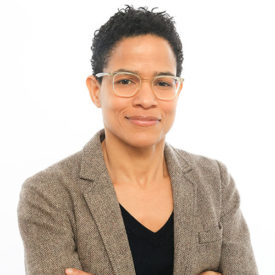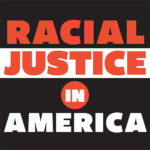Guilty: Berkeley campus community reflects on Derek Chauvin trial verdict
UC Berkeley students, staff and faculty react to the Minneapolis police officer being found guilty in the murder of George Floyd

Gretchen Kell/UC Berkeley
April 20, 2021
Prosecutors in the trial against Derek Chauvin for three weeks argued that on May 25, 2020, when the white Minneapolis police officer knelt on the neck of George Floyd, a 46-year-old Black man, for more than nine minutes that it wasn’t policing, it was murder.
After less than two days of deliberations, the 12-member jury agreed and found Chauvin guilty on the counts of second-degree unintentional murder, third-degree murder and second-degree manslaughter.
The landmark case, and trial, sparked protests against police brutality and galvanized support for racial justice in America. For UC Berkeley students, staff and faculty, the incident, which was videotaped for the world to see, was horrific. The verdict, though, brings some solace for the work ahead.
Here are some reactions from the Berkeley campus community:

Berkeley Law student Aysha Spencer is the production editor for the Berkeley Journal of African American Law and Policy. (Photo courtesy of Aysha Spencer)
Aysha Spencer, Berkeley law student and managing editor of the California Law Review
When the judge walked in to read the verdict, I literally felt like I couldn’t catch my breath. I was shaking and I was crying. With each guilty verdict he read, I just kept crying harder and harder.
It was like an out-of-body experience for me.
I started praying and thanking God, because so many of us Black students were scared that the opposite would happen: We’ve seen it happen too many times before.
It has been very difficult and debilitating to be a Black student in law school and watch this trial play out with the defense team trying to blame the victim. I’ve wanted to be a lawyer my entire life, but just knowing that the criminal justice system has historically subjugated people who look like me, I was at the point where I was thinking, “What’s the point?”
With this verdict, I’ve gotten my motivation back. This isn’t justice, this is accountability. Justice would be George Floyd embracing his little girl. But for me, there is at least a glimmer of hope that we’re on our way to making a change. And I know that this is just the beginning of the fight. We’re not even anywhere near where we need to be.
So, if I can play a part in getting us there, in my lifetime — I want to do that.

UC Berkeley professor Nikki Jones has focused her research on the impact of violence, policing and the criminal legal system on Black people in urban settings, especially Black youth. (Photo courtesy of Nikki Jones)
Nikki Jones, sociologist and African American studies professor
There are many emotions that I am feeling in this moment, but mostly I just want peace for George Floyd’s family, and whatever feels like justice for them.
What we saw in this verdict was a rebuke of the extraordinary violence of policing, but not necessarily a rejection of the ordinary dominance of policing. If history is a guide, the verdict might actually increase the capacity of the institution for the more routine forms of dominance, aggression and violence that it enacts each day.
The uprisings that followed the police killing of George Floyd created a rupture that allowed for the elevation of police abolition. Abolition remains a pathway for transformation. Abolition is not about reforms to policy and training; it is a response to the anti-Black state violence that is rooted in policing and remains in policing even after this verdict. I think that the work that organizers have been doing on the ground to push past reform and toward fundamental transformation will continue because it has endured despite what are perceived as losses or victories.
There’s not one moment that defines what justice, safety or community well-being will look like in the future. I don’t think people will be simply satisfied with this verdict — it is the most basic minimum expectation for fairness and justice that the system is meeting.
Some people may take this as a victory. Other people will understand it as potentially glossing over or hiding the deep-rooted problems that exist within policing still, and that have remained even over the course of the last year.

Élida Bautista is the interim chief diversity, equity and inclusion officer at the Haas School of Business. (Photo courtesy of Élida Bautista)
Élida Bautista, interim chief diversity, equity and inclusion officer at the Haas School of Business
I had been worried and anticipating the verdict, given previous outcomes, so I’m feeling relieved now that at least the jurors were able to find him guilty on all three counts. I think that it just gives a little bit of hope, given how many times that hasn’t been the case. But, you know, we just had another murder as we learned about the verdict, so it’s not full relief in the sense that this is over or anything. I’ve been in tears. It’s been emotional. Justice would have been for him to not be murdered. I hope that we begin to actually address the practices of policing, that we stop targeting Black and brown folks — pulling them over in traffic for minuscule things, frisking them, over-policing our communities — and that more resources are provided to community members, instead of the police being called.
Khwal Rafique, second-year student, legal studies major
Justice for George Floyd will never come from any verdict for Derek Chauvin. This world will never give him justice because he’s no longer in this world. I think the conversation needs to go so much deeper. The problem is actually the system of oppression that we see targeting the Black community in this country and targeting other people of color and Indigenous folks.
So, although I’m glad the verdict came out to be guilty on all three charges, I think we need to focus on the fact that, regardless of the verdict, the only way that we can ever bring any sort of justice to George Floyd or any of the Black people who have been brutally murdered by these systems is by fighting to really erase these systems.
I am, fundamentally, an abolitionist. I believe that these systems can’t be changed because these systems are doing exactly what they’re supposed to be doing.
When we only focus on dismantling an institution, we’re still leaving intact the cultural and economic and political conditions that make these systems of oppression flourish. When we don’t have a complete reorganization of society, which we haven’t had to this day, that’s why we see one institution be dismantled and then another coming in its place. And it’s basically just translations of oppression that are still here today. That, right there, needs to be at the core of the work that we do.
Kai Koerber, second-year student, data science major
When I was 12, Trayvon Martin was killed. It is obviously very distressing to see your people beaten down, shot down and killed in the street with no penalty after. With Chauvin being found guilty on all counts, it feels like we have finally got some justice after years of neglect. It used to be that, regardless of what crime was committed, police would get off scot-free because they were part of a nationwide brotherhood in this country. It definitely feels like we’re taking a step in the right direction for public safety for all and social equity. People have been fighting for this for a long time. Now, it feels like there’s change that accompanies these protests. To see things changing in a more steadfast and visceral regard is absolutely incredible. It’s been a long time coming.

Berkeley public policy professor Jack Glaser (Photo courtesy of Jack Glaser)
Jack Glaser, social psychologist and policing scholar at the Goldman School of Public Policy
If a jury cannot convict a police officer of murder under these circumstances — a slow-motion, nine-minute strangulation of an unarmed, handcuffed man, caught on video from multiple perspectives, with bystanders pleading for him to stop — then it’s hard to imagine a case where they can. So, given the extreme circumstances, the case isn’t a good test case, except as a proof of concept, but police officers have been found guilty of murder before. Consequently, the guilty verdicts in this case don’t give us a lot of confidence that police can be held accountable without such overwhelming evidence. Pardon the expression, but we dodged a bullet.
On the other hand, that he was found guilty on all three counts, including second-degree murder, is significant. Furthermore, that law enforcement officials testified forcefully against him is unusual and encouraging. I hope that will be the beginning of a trend, and I hope that it reflects a greater willingness to stand up against bad policing — not only in court, but in the field. I’m very proud to be serving on the Research Advisory Board of Active Bystandership for Law Enforcement (ABLE), which seeks to promote just this sort of courage and independence of thought and action. I’m encouraged that it seems to be catching on.


